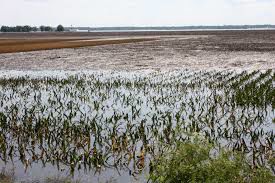Editorial: Be proactive on climate change

flooded field
July 12, 2019
When record-breaking floods aren’t dominating headlines, it may become easier to let the long-term effects of extreme weather events caused by climate change fall to the back of one’s mind.
The ongoing agricultural impacts, however, are staggering.
The U.S. Department of Agriculture releases a crop progress report each week, where Iowans can compare this year’s crop progress to years past. According to the most recent report, released Monday, only 1% of corn has reached the silking stage — compared to 31% at this time last year
Soybeans, another major Iowa crop, are slowing as well. The percent of soybeans that have emerged is down 4% from both last year’s percentage and the state’s five-year average. The percent having bloomed is down 35% from this time last year and down 23% from the average.
This shouldn’t be a surprise. The fourth National Climate Assessment predicted flooding and “extreme precipitation” would increase throughout the Midwest, with substantial impacts on crop production, which subsequently impacts the state’s economy. Specifically, the report warns of a 25% decrease in corn production by the middle of the century.
Perhaps, had it not been disbanded, the Iowa Climate Change Impacts Committee could have predicted this as well. No such committee has been formed since, and the most recent publication mentioning “climate change” in the State Library is from 2015.
While researchers around the state study the impacts of climate change in various capacities, the state government has taken an adamantly reactive stance. While it made resources available to those who suffered from the floods this spring, it failed to listen to voices that could have helped strengthen the state’s infrastructure and agriculture in preparation for the flooding.
In a gubernatorial debate last year, Gov. Kim Reynolds described the impacts of climate change as “overstated.” However, her administration has done little to study what those impacts even look like.
As far as the first half of 2019 goes, those impacts include dramatic decreases in crop production, destroyed homes and one death attributed to the flooding.
Iowans have the brainpower, tools and drive to study these issues and find solutions. Let them.






